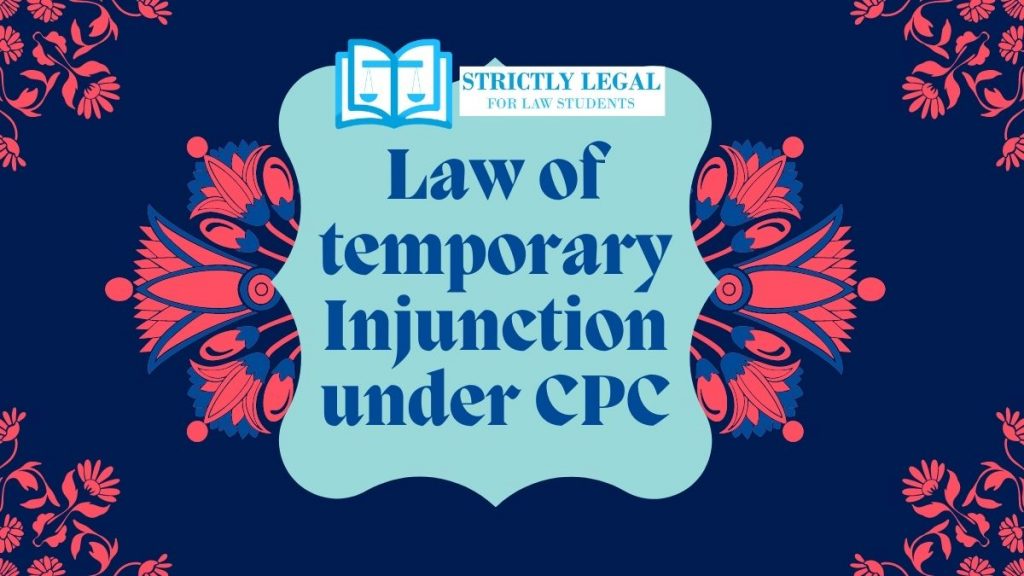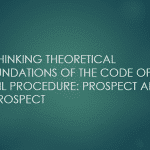This blog discusses the meaning, object and grounds for issuance of a temporary injunction under the Code of Civil Procedure, 1908 (CPC). The latter part deals with some FAQs related to the application for temporary injunction.
Table of Contents
What is the meaning of temporary injunction?
Temporary Injunction refers to the Judicial Intervention of maintaining a ‘status quo’ i.e ‘existing condition’ of a thing applied by either of the parties as an interim relief during the pendency of proceedings of a case. It is an order of the court that restrains (Prohibitory injunction) or requires a person to do a particular act (Mandatory Injunction).
It is in the nature of protective relief granted keeping in mind the rights of both the parties to prevent a future irreparable injury.
Temporary injunction meaning in Indian law has been defined under Section 37(1) of the Specific Relief Act, 1963 as, “Temporary injunctions are such as are to continue until a specific time, or until the further order of the court, and they may be granted at any stage of a suit, and are regulated by the Code of Civil Procedure, 1908 (5 of 1908).”
In what cases can temporary injunction be issued?
Order 39 of the Code of civil procedure,1908 lays down the provisions regarding temporary injunction that applies to cases of civil nature. However, the general principles of Order 39 CPC apply to laws such as Electricity, Matrimonial, Tenancy, Writs and PILs. This list is indicative and not exhaustive.
Difference between stay and injunction?
A stay is an order restricting or prohibiting or suspension of judicial proceedings or a court from doing something. Whereas an order of temporary injunction restricts or prohibits or requires a person to do something. An order of stay is issued to a court but an order of injunction is issued to a party. Injunction thus acts in personam and not in rem.
One major difference between an Order of Stay and an Injunction is that an order of stay becomes effective only when it is communicated to the court to which it is issued but an order of injunction becomes effective as soon as it is issued. This was held in the case of Mulraj V. Murti Rahjunathji Maharaj, AIR 1987 SC 1386
Can Injunction be issued against a court?
An injunction is an act in personam and not an act in rem and it cannot be issued against a court. This is the view of Halsbury law of England and this view was also seen to be supported in the case of Food Corporation of India v. Sukh Deo Prasad 2009 SCC 665.
To be specific, a temporary injunction is granted under CPC cannot be issued against a court. A temporary injunction may be granted against a party to the suit and in some circumstances against any person for whom a right of action exists.
What are the Grounds for Injunction?
Order 39 Rule 1 enumerated several grounds for which an order of injunction may be issued. However, the use of ‘Maybe granted’ indicated that the list is not exhaustive and exclusive.
A temporary injunction under CPC may be granted on the following conditions:
- Where a property in dispute exists and there lies a risk that it will be damaged, wasted or alienated by any party to the suit or be sold in execution of a decree.
- Where a defendant intends to or threatens to dispose off or sell the property to defraud its creditors.
- Where a defendant is about to commit a breach of contract.
- Where a defendant threatens to dispose the property or cause injury to the plaintiff in relation to any property in dispute in the suit.
- Where the court is of the opinion that a just and equitable ground exists.
Triple Test for injunction
The Power to grant an injunction is not limited to the text of the law, but it is guided by the discretionary powers of the court. However, discretion must be exercised with due regard to justice, equity and good conscience. In other words, discretion must be founded on the basis of reasonableness, and sound legal principles. The Indian law follows the triple tests when it comes to deciding a matter of injunction however, this test is not absolute but merely illustrative. Even if all the three tests are satisfied the court may refuse prayer for an injunction on the circumstances of the case,
Generally, before granting the injunction the court must be satisfied-
If the plaintiff has a prima facie case?
Without examining the merits of the case closely but on considering matters on the face of it like Whether there’s a bona fide cause and if there’s an arguable case the court must decide. The burden is on the plaintiff to convince the court that there’s a Prima Facie case by furnishing sufficient evidence or otherwise in his favour.
It was held in Kashi Nath Samstan V. Shrimad Sudhindra Thirtha Swamy (2010) I SCC 689, 692 that prima facie case must precede an order of injunction. Only if there’s a prima facie case then the court will move ahead to examine other factors. If the prima facie case is not made out, the applicant is not entitled to a temporary injunction.
If there’s an irreparable harm foreseen?
The applicant must further satisfy the court that there’s a possibility of irreparable harm to him and that if an order of temporary injunction is not issued will injury him. Irreparable harm may refer to damages that may not be possible to be compensated in pecuniary terms.
In American Cyanamid Co. v. Ethicon Ltd 1975 the court has rightly pronounced the principle of irreparable harm as follows:
If damaged in the measure recoverable at common law would be an adequate remedy and the defendant would be in a financial position to pay them, no interlocutory injunction should normally be granted, however strong the plaintiff’s claim appeared to be at that stage. If on the other hand, damages would not provide an adequate remedy for the plaintiff in the event of his succeeding at the trial, the court should then consider it as irreparable harm.
It must be noted that the expression Irreparable injury does not mean that there should be no possibility of repairing the injury. It only means that there exists no specific or fixed pecuniary standard for measuring damages.
If there’s a balance of inconvenience?
The balance of inconvenience must be in favour of the applicant. Before granting an order of Injunction the court must be satisfied that the mischief, hardship or inconvenience which is likely to be caused on refusal to the plaintiff is greater than that which is likely to be caused to the opposite party by granting it.
The court using sound judicial determination must weigh both sides before granting any relief in a form of interlocutory orders such as an injunction under CPC.
It should also be noted that the court grants such relief as ex debito justitiae i.e to meet the ends of justice.
How long does temporary injunction last?
The validity of a temporary injunction depends on the type of injunction granted. For example, If the injunction granted is pendente lite it will be valid till the proceedings of the case are disposed off and until the case is finally decided. If the suit is dismissed the injunction is also vacated. If the suit is for permanent injunction, a temporary injunction made by the court is made perceptual or permanent as a part of a decree passed by the court.
You should also read: Stay Orders, Temporary Injunctions & Interlocutory Orders – Useful Book for Practising Lawyers and Juniors of the Bar. Buy the Hardcover from Amazon
Format of application for temporary Injunction
BEFORE THE SENIOR CIVIL JUDGE OR DISTRICT JUDGE AT _________
CIVIL SUIT NO. __________ OF 20__
IN THE MATTER OF:
Mr. _________ PLAINTIFF/ APPLICANT
VERSUS
Mr. ____________ DEFENDANT/ RESPONDENT
INJUNCTION APPLICATION
MOST RESPECTFULLY SHOWETH:
The Plaintiff / Applicant, above named, respectfully submits as under:
1. That the Plaintiff has filed the above titled suit against the Defendant / Respondent for decree of Specific Performance of Agreement to Sell dated _____ and Memorandum of Understanding dated ___ and same is pending before this Hon’ble Court.
2. That by aforesaid agreement to sell, the Defendant / Respondent agreed to sell and transfer to the Plaintiff the Suit Property, fully described in the Plaint. Copy of the said agreement and Memorandum of Understanding has been annexed to the Suit.
3. That the Plaintiff paid to the Defendant a sum of Rs ______ by Cheque No____ dated by way of earnest money. Balance of Rs.______ was to be paid at the time of execution and Registration of Sale Deed.
4. The at the time of Execution of the said agreement, the Defendant put the Plaintiff in possession of the said property.
5. That the Sale Deed was to be executed and got registered on ________. But on the given date the Plaintiff visited the office of the Sub-Registrar in connection with execution and registration of sale deed. The Plaintiff took along the balance sale consideration of Rs. _____. The Plaintiff kept on waiting for the Defendant, but the Defendant did not visit the office of the Sub-Registrar in connection with execution of the Sale Deed. The Plaintiff got his appearance marked at the office of Sub-Registrar by filing an application.
6. That thereafter the Plaintiff served a legal notice on the Defendant through his Advocate on______ through Registered post, but no reply has been received so far from the Defendant. All the attempts on the part of Plaintiff to persuade the Defendant to complete the transaction in terms of the said agreement have failed.
7. That the Plaintiff has always been ready and willing to perform his part of the contract.
8. That the Plaintiff has a prime facie case in his favour and balance of convenience also lies in his favour.
9. That the suit property is situated within the Jurisdiction of this Hon’ble Court. Having regard to the cause of action, narrated above, this Hon’ble Court has the Jurisdiction to entertain any try this Suit.
10. That the Plaintiff has come to know that the Defendant is trying to dispose of the Suit Property and for this purpose, some persons have contacted him through a property dealer. In case, Defendant not restrained from disposing of or creating third party interest in respect of the Suit property during pendency of the Suit, Plaintiff shall suffer irreparable injury and loss which cannot be compensated in terms of money. Any such transaction would also lead to multiply of proceedings.
10. In the facts and circumstances of case mentioned herein above this Hon’ble Court may graciously be pleased to:
P R A Y E R
That the Plaintiff, therefore, pray that this Hon’ble Court –
a) to Grant ad-interim relief of Injunction in favour of the Plaintiff and against the Defendant restraining him and/ or his servants, agents or nominees from selling, disposing of, assigning or in any way transferring the suit property to any person, during the pendency of the aforesaid suit;.
b) to grant any other relief, which the Hon’ble court deems fit, may please be granted to the plaintiff in the interest of justice.
PLAINTIFF/ APPLICANT
THROUGH
______________., Advocate
Place :
Date :
For more such drafts you can Buy 2050+ Legal Drafts Ready-Made for Law Professionals!

Passionate about using the law to make a difference in people’s lives. An Advocate by profession.





